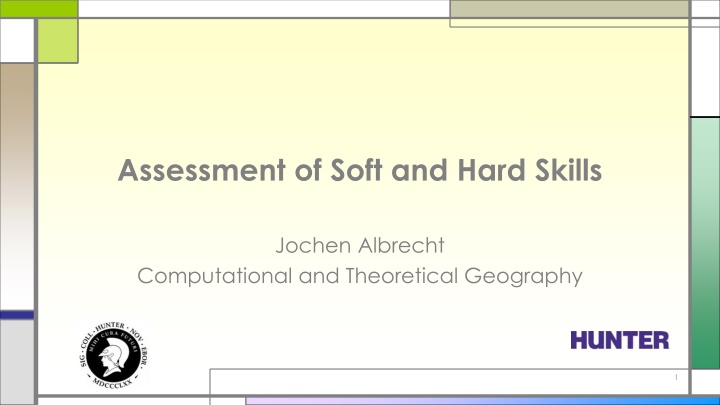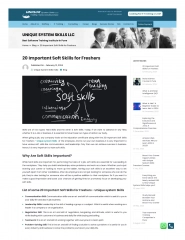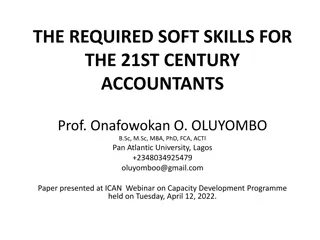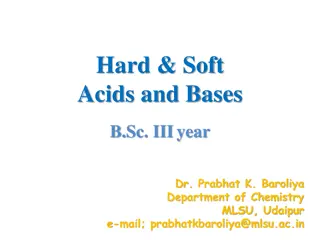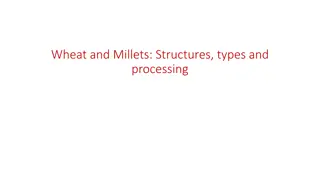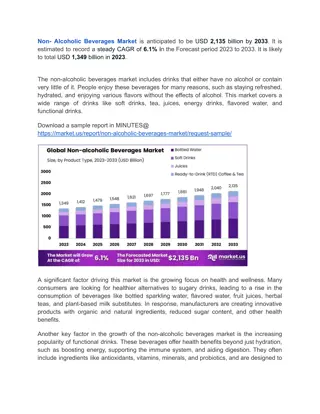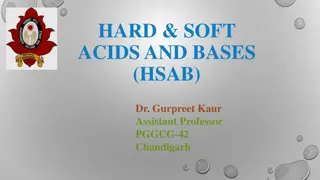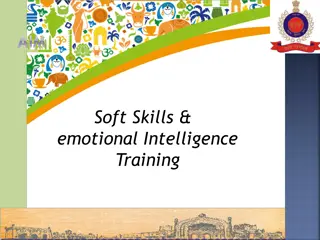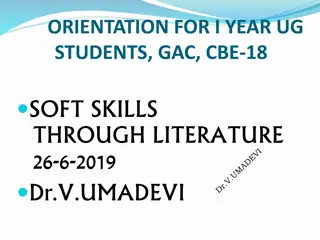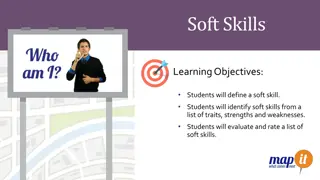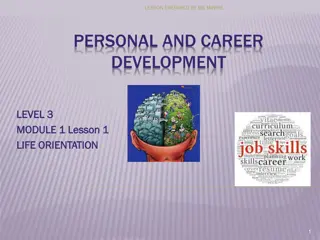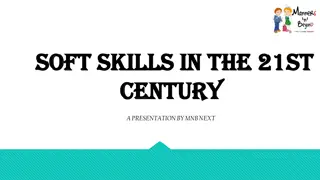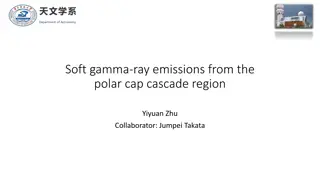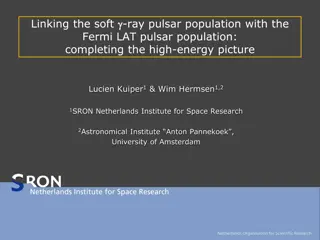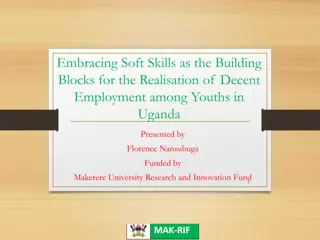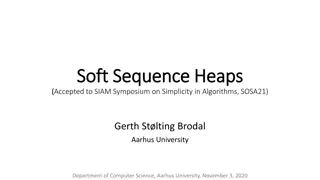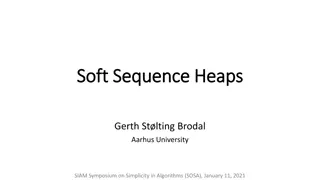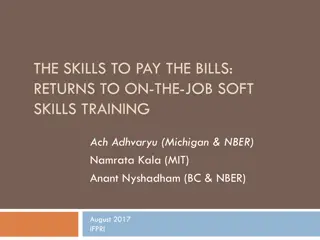Assessment of Soft and Hard Skills
This article discusses the assessment of soft and hard skills in computational and theoretical geography, providing insights into evaluating different skill sets in this field. It examines the importance of both types of skills and their applications within the context of geography research and study.
Download Presentation

Please find below an Image/Link to download the presentation.
The content on the website is provided AS IS for your information and personal use only. It may not be sold, licensed, or shared on other websites without obtaining consent from the author.If you encounter any issues during the download, it is possible that the publisher has removed the file from their server.
You are allowed to download the files provided on this website for personal or commercial use, subject to the condition that they are used lawfully. All files are the property of their respective owners.
The content on the website is provided AS IS for your information and personal use only. It may not be sold, licensed, or shared on other websites without obtaining consent from the author.
E N D
Presentation Transcript
Assessment of Soft and Hard Skills Jochen Albrecht Computational and Theoretical Geography 1
Overview Developing a curriculum Knowledge, skills and abilities Student learning and GenEd outcomes Assessment tools Closing-the-loop Online versus face-to-face Asynchronous online teaching 2
Introduction Revamp of (under)graduate instruction of GIS aka Geographic Information Systems & Science DACUM Developing a Curriculum NSF Grant for GeoTech Center to develop a DACUM for GIS & Remote Sensing Survey (bi-annual) among employers in Metro NY 3
Hard Skills of the GIS DACUM Duties Cluster of related tasks; large area of work described in performance terms Tasks Job activity with meaningful outcome; results in product, service or decision; can be measured Steps Specific activities required to perform a task 4
Duties Manage data Generate data Process data Analyze data Manage software & hardware Manage projects Generate products and services Professional development 5
Tasks (examples) Under Manage Data Research data sources Acquire data Organize data Backup and restore data Convert / reformat data Design and edit databases Validate data 6
Knowledge Coordinate systems, projections GPS, surveying, geotagging Mathematics Photogrammetry, remote sensing Programming, scripting Statistics 7
Skills mostly soft Cartography Communication Critical thinking Organizational Presentation, communication Problem solving Team Player, interpersonal skills Time management Writing 8
Translated into GTECH 201 Student Learning Outcomes Use specialized geospatial software to transform ellipsoid, datum, and/or map projection to georegister one set of geospatial data to another Understand cartographic symbolization Know how to create thematic maps: classification, choropleth maps, dot density maps, and multivariate displays Understand the basic operations of GIS for data input and secondary data Employ simple spatial reasoning techniques to make inferences about space, spatial patterns, and spatial relationships Understand the basic theory and applications of remote sensing, aerial imagery and global position system, including (a) Differences in sensor technologies (b) Different types of resolution used in remote sensing (c) Capabilities and limitations of sensor types 10
Translated into GTECH 201 General Education Outcomes Computer Literacy: Demonstrate proficiency in using a computer and computer applications to accomplish geospatial technology tasks Information and Technology Literacy: Students will be able to collect, evaluate, and interpret information and effectively use information technologies Scientific Method: Formulating a research question, collecting data, and developing and testing of a hypothesis 11
Translated into GTECH 361 Student Learning Outcomes Understand GIS concepts, technical issues, and applications, such as metadata, spatial data quality, spatial data models Understand the data creation process and create simple data sets and/or add to existing data, including but not limited to (a) Geocode a list of address-referenced locations to map data encoded with geographic coordinates and attributed with address ranges (b) Design a questionnaire and interview protocol for acquiring georeferenced socio-economic data (c) Transform data acquired from a range of geodata portals Develop the operational skills to perform GIS related tasks such as geometric measurements, overlay, viewshed analysis, and raster map algebra Create and manipulate geodatabases, including the ability to compile, code, categorize, calculate, tabulate, and verify data Perform basis GIS analyses including, for example, performing a site suitability analysis using intersection and overlay functions 12
Translated into GTECH 361 General Education Outcomes Computer Literacy: Demonstrate proficiency in using a computer and computer applications to accomplish geospatial technology tasks Information and Technology Literacy: Students will be able to collect, evaluate and interpret information and effectively use information technologies Interpersonal Skills: Listen to and consider others viewpoints; work effectively with people who have diverse personalities and backgrounds Ethics: Privacy and awareness of obligations to individuals, to employers and clients, to colleagues and the profession, and to society Professionalism: Students will have learnt to accept criticism from peers and to stay calm and think clearly in stressful situations 13
Assessment Lab exercises With detailed instructions Figure it out Participation In-class Discussion boards Software projects Individual projects Group projects Quizzes and exams Multiple choice Short essay Homework assignments Critical analysis of readings 14
Assessment of Software Projects Proposal, project update and final report Project management throughout the semester Presentation in front of peers (and clients if applicable) Writing style Creativity Adherence to guidelines Independence Recognition of need when to seek help Visual style (map) Self-critique 15
Online versus Face-to-Face Difference between intro and advanced course Intro course requires face-to-face Online class is technically better But: Soft skills suffer Communication, organization, interpersonal skills and time management are better in face-to-face environment Why? 16
Asynchronous Online Teaching Why do students chose the online version? Tight personal schedule Preference for anonymity When questions arise and answer is not immediate* Window of time in personal schedule closes Frustration levels peak Cognitive distance of the online medium leads to outbursts Lack of social control increases time management problems 17 * = 15 minutes
Soft Skills in an Online Environment This slide is in lieu of a conclusion slide Jochen has no solutions to the question how to teach these soft skills in an online environment Instead of the usual Do you have any questions? Do you have any suggestions? 18
